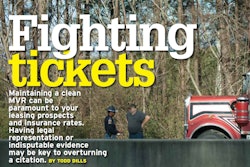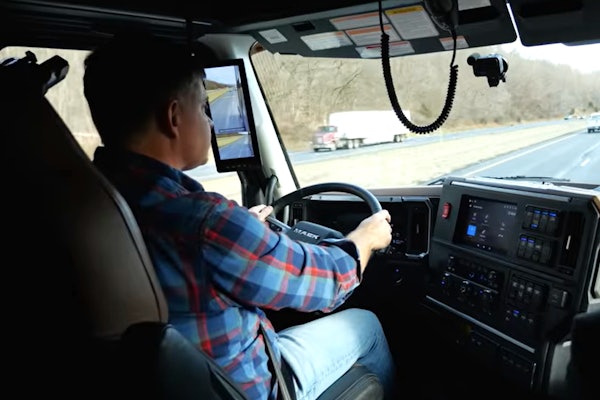Trucking news and briefs for Monday, March 29, 2021:
While Biden admin seems to favor VMT, report finds costs may outweigh benefits
In a hearing before the House Committee on Transportation and Infrastructure Thursday, Transportation Secretary Pete Buttigieg mentioned "user fees" as a possible source for infrastructure funding, and that he was "very open" to a potential national vehicle miles traveled (VMT) tax as a source of funding for the Highway Trust Fund (HTF).
The HTF – the primary source of federal funding used by state governments to maintain and improve roads – is funded currently almost exclusively by a per-gallon excise tax on gasoline and diesel fuel. The current federal fuel tax rates of 18.4 cents on gas and 24.4 cents on diesel were last increased in 1993. Since then, improvements in vehicle miles per gallon, combined with inflation over that 28-year span, have undercut the HTF's ability to adequately fund roads projects and the roughly $40 billion fund has faced annual shortfalls for more than a decade.
Last February, several U.S. Senators proposed a VMT tax exclusively on trucks. VMT has long been seen as a more consistent stream of funding, especially as the nation begins its shift to electrified vehicles that would circumvent a fuel tax entirely.

The Owner-Operator Independent Drivers Association recently sent a letter to the Senate Committee on Finance voicing its opposition to a truck-only VMT tax, saying the trucking industry already pays its fair share in taxes for highway use.
"Proponents of a truck-only VMT have insinuated that truckers don’t pay their fair share into the HTF," OOIDA said in its letter. "This is preposterous. Not only is the trucking industry currently paying more than its fair share, a report by the Congressional Budget Office (CBO) found HTF revenues derived from motor carriers through the heavy-vehicle and tire taxes will increase over the next decade. Between the current diesel tax and these supplemental taxes that other highway users do not pay, the trucking industry is estimated to increase its contributions to the HTF over the same period of time. Clearly, our industry is not the problem."
OOIDA added that between 2019 and 2029, the gasoline tax is expected to drop by 11%, "meaning passenger vehicles will remain largely responsible for ongoing funding shortfalls... If Congress would like to properly address diminishing HTF returns, it must be honest about the driving force behind them. Rather than singling out trucks, you should start by ensuring passenger vehicles are also providing stable and reliable revenue for our highway infrastructure."
Additionally, a report compiled by the American Transportation Research Institute found that costs associated with implementing a national VMT tax on trucks and cars could far exceed any revenue gains.
ATRI found that replacing the fuel tax with a VMT tax, which would be assessed on 272 million private vehicles, could result in collection costs of more than $20 billion annually – about 300 times higher than the federal fuel tax. Collection points currently are fewer than 270 companies that own fueling terminals, but with a VMT that would balloon to "every registered motor vehicle in the U.S.," ATRI noted.
Hardware costs alone (mostly attributable to providing motorists with a GPS-enabled device) could have an initial price tag of $13.6 billion and require ongoing replacement. Telecommunications costs would be approximately $13 billion annually, and account administration would be an additional $4.3 billion each year, ATRI estimated. "On top of these costs, credit card transactions for electronic payment and even the shipping costs for the hardware could each cost more than $1 billion," the agency said.
Further, ATRI said, without the ability to ensure mandatory participation in the VMT tax and methods in place to collect delinquent payments, incidents of VMT tax evasion are likely to be high.
Rate structure, ATRI said, would be key in achieving wide-ranging goals of any potential VMT tax, but there is no clear-cut best option. The simplicity of a flat rate VMT "is generally not able to meet certain social or environmental policy objectives that go beyond revenue generation," the report said. "If the stated goal of a VMT tax goes beyond revenue collection, then a variable rate is necessary."
Variable rates, which could allow state and local jurisdictions to set customized rates in addition to the federal VMT tax, would be "confusing," ATRI suggested, "and it is unclear how price signals would be channeled to drivers. A worst-case scenario would have drivers not receiving the price signals, and unknowingly accruing expenses that they did not intend or could not afford."
A hybrid approach, with a flat federal rate and variable state rates, could be deployed but a per-mile charge would need to be clearly defined at state boundaries, and there could be no variability based on time or below state-level boundaries. That's an approach somewhat similar to the IFTA system but like the variable rate approach, a hybrid option would require expensive onboard GPS-level tracking technology.
With the possibility of identifying VMT by roadway, a VMT tax system could end the double taxation issues, like paying both a toll and a fuel tax. While that may sound like good news, ATRI contended it would drop several billion dollars in revenue from the Highway Trust Fund.
Werner driver receives CVSA’s IDEA honor
 Werner Enterprises driver Allen Parker received the Commercial Vehicle Safety Alliance's International Driver Excellence Award.
Werner Enterprises driver Allen Parker received the Commercial Vehicle Safety Alliance's International Driver Excellence Award.Werner Enterprises truck driver Allen Parker is the recipient of this year’s International Driver Excellence Award (IDEA) from the Commercial Vehicle Safety Alliance. Parker has been with Werner for more than 34 years and has safely driven more than four million accident-free miles.
In addition to his stellar safe-driving history, Parker also does his part for the community. He sings the national anthem before the stock car races at the Jefferson County (Nebraska) Speedway and at the start of Minor League Baseball games. In addition, Parker participates in the World’s Largest Truck Convoy for Special Olympics. The convoy is a one-day celebration of the trucking industry, its allied partners and law enforcement, all working together to raise funds for the Special Olympics.
CVSA recognizes the exceptional careers of professional truck drivers and their commitment to public safety through its driver excellence award. To apply for the award, nominees must have at least 25 cumulative years of crash-free driving in a commercial motor vehicle with a clean driving record for the past three years, no felony convictions, no safety-related driving suspensions in the past three years and no driver violations in the past three years, excluding form and manner violations.
“My reaction upon hearing the fantastic news that I’d received the International Driver Excellence Award was to be humbled,” said Parker. “To be acknowledged by CVSA is truly an honor.”
CVSA’s IDEA isn’t the only award Parker has received throughout his driving career. He has received multiple President’s Safe Driving Awards from the Nebraska Trucking Association, Werner’s Safe Driver Awards, and one, two, three and four million accident-free miles awards from his company.
When he has time away from driving, Parker travels with his wife, singing southern gospel music at churches and gospel music events. In fact, he and his wife have recorded four albums in Nashville.
Parker will receive his award at the 2021 CVSA Annual Conference and Exhibition in the fall. He will be presented with a crystal trophy and a check for $2,500. At this time, the annual conference is still scheduled to be held in-person in Wilmington, Delaware. PrePass Safety Alliance sponsored this year’s IDEA.
Forward Air boosts owner-operator pay
Forward Air Corp. announced its largest ever rate-per-mile increase to its independent contractor fleet within its LTL and truckload divisions.
Team owner-operators for the company are receiving an 11 cents-per-mile increase, while individual owner-operators will see a 5 cents-per-mile increase.
In addition to the rate per mile increase, the company announced a sign-on bonus program to help drive first-year profitability for transitioning owner-operators or fleet owners. The bonus consists of $10,000 per team truck and $4,000 per solo truck added to the Forward fleet – all paid out in the first year of service.










